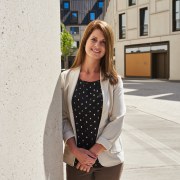Artificial intelligence changing the world: how science centres and museums can contribute to understanding AI
Malta Experience Auditorium
Artificial intelligence (AI) is a pervasive technology which extends to many industries and activities. The development of AI lies at the complex intersection of technical, natural, human and social sciences, thus obscuring the underlying principles and premises that inform AI solutions. This makes communicating AI in a science centre or museum setting a very challenging task, as visitors arrive with their subjective hopes, fears and questions. The challenge for science centres and museums then is to unmask the “black box” of AI so that visitors are better able to critically reflect on what AI can or should do. This includes untangling system complexity, uncovering biases, clarifying premises and effects, as well as showing how AI manifests itself in everyday life - something visitors can connect to.
Outcomes: what will participants get from this session? Skills, knowledge, experience etc.
Speakers will share their experiences and thoughts when communicating artificial intelligence to different audiences with different means. In addition to introducing the interdisciplinary nature of AI, the session will focus on the challenges related to the data and algorithms behind the AI, as well as the decision-making based on AI solutions. The speakers will also invite the audience to discuss unique ways of grappling with those challenges and reflect on the effect of their exhibits.
Session speakers
As more and more areas of daily life become governed by algorithms and big data, the analogue and digital worlds blend into one. Rosalina will reflect on the premises about AI that underline Futurium’s exhibit “Blending realities”, as well as on the interactive Augmented Reality (AR) format used to convey them. She will further expound on how the exhibit could be updated based on new insights from AI research and practice.
Project manager / Designer
We must understand Artificial Intelligence and its effects to make decisions about it in democratic society. But how to make such invisible and complex themes understandable? Is it possible through hands-on exhibition? Sampsa will share experiences creating Science Centre Heureka’s exhibition on AI – how complex topics turn in to physical user interfaces and how narrative helps both the visitor and the designer.
Deutsches Museum Nürnberg
Artificial intelligence is associated with promises of salvation and hopes, but also with doomsday scenarios and fears. Jana will present how the exhibition at the Future Museum not only puts technology to the test in dialogue with visitors, but also discusses the ethics behind it. According to which criteria should an AI make decisions? Can an AI be neutral? And are we going to be willing to trust an AI with our life?
Gunnar will present and discuss different didactical and scenographical concepts for exhibiting the complex topic of AI. From the designer's perspective, he will talk about the idea of creating an atmosphere for open communication and productive exchange by focussing on visitors and their everyday lives. He will also discuss the problems the team was facing by common preconceptions and expectations in the context of AI and share insights whether it was possible to develop analog exhibits on AI - or not.





